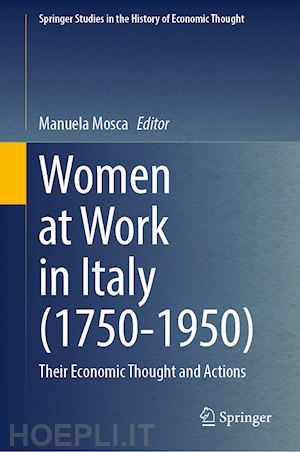
Questo prodotto usufruisce delle SPEDIZIONI GRATIS
selezionando l'opzione Corriere Veloce in fase di ordine.
Pagabile anche con Carta della cultura giovani e del merito, 18App Bonus Cultura e Carta del Docente
This book reconstructs the economic thought of Italian women who produced written sources, and of those whose “only” legacy was their actions. The conceptual tools of economic history and the history of economic thought alike are used to reveal the economic ideas of women overlooked by historiography in four fields, namely as entrepreneurs, workers, educators, and politicians. As for the entrepreneurs, the book examines the businesswoman Isabella De Mari Doria (eighteenth century) and other figures active in both the industrialized and the informal sectors in the nineteenth century. The important issues of female employment and wage discrimination based on gender are analyzed, taking into account the debates of the period. In turn, the role of women in economic education in the first half of the twentieth century is reconstructed through the figure of Aurelia Josz, an educational entrepreneur who trained female agricultural entrepreneurs, managers, and teachers, and by exploring the presence of women at universities, both as students of economics and as educators and researchers. Lastly, the book takes a closer look at women involved in politics who dealt with economic issues: the socialist Anna Kuliscioff, the fascist Margherita Grassini Sarfatti, and the 21 women who took part in the Italian Constituent Assembly in June 1946. Given its scope, the book appeals to scholars and students of the history of economic thought, economic history, and women’s studies.
Chapter 1. Italian women of the past: their economic culture and actions (Manuela Mosca).- Part I. Women in business.- Chapter 2. Isabella De Mari Doria, a female investor and gambler in the Genoese aristocracy (Antonio Iodice).- Chapter 3. Women and business: fresh evidence from the probate records of Milan (1862-1900) (Stefania Licini).- Chapter 4. Female entrepreneurs and economic development in Capri (1900-1960). A case study: La Parisienne (Rossella Del Prete).- Part II. Women in the labour market.- Chapter 5. From the edge to the heart: female employment in 19th century Italy (Giuliana Freschi).- Chapter 6. Labour market segregation: female teachers in Southern Italy (1861-1937) (Vittoria Ferrandino).- Chapter 7. Incomes and employment of Italian women (1900-1950) (Giacomo Gabbuti).- Part III. Women in education.- Chapter 8. Aurelia Josz, educational entrepreneur, and her school of agriculture for girls (Giandomenica Becchio).- Chapter 9. Female students and graduates in business and economics in Turin (1906-1940) (Laura Giartosio).- Chapter 10. Academic research and university careers of women economists during the fascist regime (Letizia Pagliai).- Part IV. Women in politics. Chapter 11. Anna Kuliscioff’s labour economics (Luca Michelini).- Chapter 12. Margherita Grassini Sarfatti, the economic thought of the Jewish woman who popularized fascism (Francesco Poggi).- Chapter 13. In the name of equality. Women’s action to shape the right to work in the Italian Constituent Assembly (Claudia Rotondi).
Manuela Mosca is a full professor of the history of economic thought at the University of Salento (Lecce, Italy). Her main research interests are on Italian marginalism, on the history of monopoly power, and on women and economics in the historical perspective.











Il sito utilizza cookie ed altri strumenti di tracciamento che raccolgono informazioni dal dispositivo dell’utente. Oltre ai cookie tecnici ed analitici aggregati, strettamente necessari per il funzionamento di questo sito web, previo consenso dell’utente possono essere installati cookie di profilazione e marketing e cookie dei social media. Cliccando su “Accetto tutti i cookie” saranno attivate tutte le categorie di cookie. Per accettare solo deterninate categorie di cookie, cliccare invece su “Impostazioni cookie”. Chiudendo il banner o continuando a navigare saranno installati solo cookie tecnici. Per maggiori dettagli, consultare la Cookie Policy.